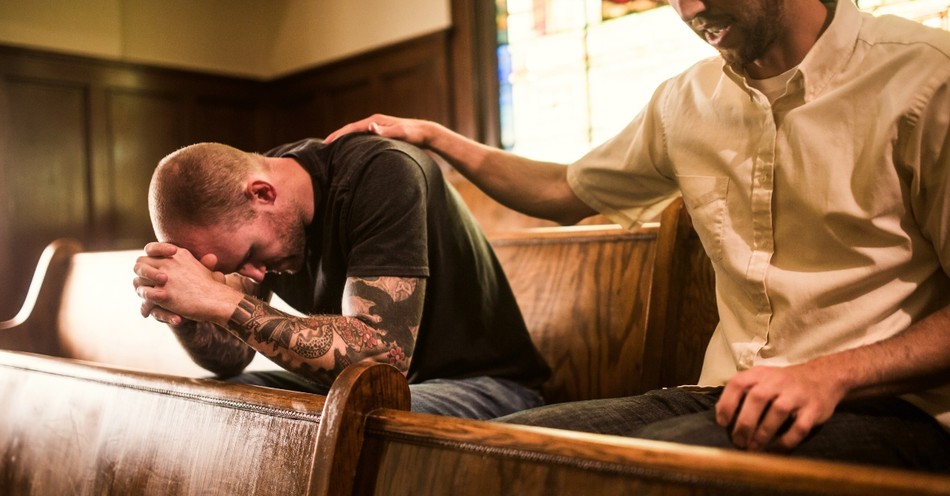Check out Barnabas Piper's newest book, Belong: Loving Your Church by Reflecting Christ to One Another, for more on how to build authentic Christian fellowship and belonging in the church.
If you are like me, there is little correlation between stereotypical church fellowship and finding a place where you truly belong (what we are looking for in a church). “Fellowship” has been relegated to potlucks and pancake breakfasts and forced fun and icebreaker games.
Belonging is something so much deeper, a soul-level connection that speaks to our yearnings and needs and draws us in. Belonging is finding the kind of place, the kind of community God has designed us for.
The problem is that we have cheapened the reality of fellowship in the church, and in the process, we have made it difficult for people to belong.
A simple way to define true Christian fellowship is a gathering of believers where the Bible’s one-another commands are lived out with joy. Here’s a non-comprehensive list of these commands:
Love one another (John 13:34); Build one another up (1 Thessalonians 5:11); Bear with one another (Colossians 3:13); Forgive one another (Ephesians 4:32); Serve one another (Galatians 5:13). Be devoted to one another (Romans 12:10).
Pray for one another (James 5:16); Teach one another (Colossians 3:16); Live in harmony with one another (Romans 12:16); Submit to one another (Ephesians 5:21); Honor one another (Romans 12:10); Welcome one another (Romans 15:7); Encourage one another (1 Thessalonians 4:18); Exhort one another (Hebrews 3:13).
Imagine being in a group of Christians who, transformed by Jesus, interacted this way. It’s hard to imagine not having a sense of belonging, right? It would be the most uplifting, Christ-centered, happy, unified group of people. And that is precisely Christ’s design for his church.
Christian fellowship doesn’t just happen. We have an impressive but sad ability to gather together with consistency and frequency and still fail at meaningful fellowship. We can even study the Bible and miss out on it.
But if we are intent on trusting Christ to work in us as we gather and open to being Christlike as we gather, then — whether it’s for a meal or a church service or a golf game or a playdate for the kids — we share in that beautiful fellowship.
We were designed for this kind of fellowship, this kind of connection in Jesus, and we cannot find it anywhere but the body of Christ. This is what finding true belonging in the church looks like.
Finding True Belonging
“Belonging” means more than just feeling at home or at ease. We belong when we are fulfilling the design God has given us and living as he made us to live. And he made us to be part of his church, to find a place of honesty and safety and patience and healing and fellowship.
Sadly, we will not always feel like we belong. Church will not always go smoothly, either because of something awry in our hearts, or because of something awry in the body of believers, or maybe because of both.
When we feel like we don’t belong, we often live with a foot out the door and an eye on other possibilities. We hold back relationally, and we hold back our gifts, talents, and resources (or we give them elsewhere, in places we feel like we belong).
We give less to the church and are unable to receive as much too. That, of course, becomes a self-perpetuating negative cycle: holding back means we feel like we belong less, so we hold back more, and so we feel we belong less… Here’s the stark reality: you can never truly find belonging at a church unless you commit yourself to it.
Commitment to a church can sound intimidating and risky, especially if you have been hurt in church before. But think about some marks of genuine belonging — a church culture shaped by the gospel, a culture of safety, honesty, patience, bearing with one another, a place of true fellowship. Committing yourself to that is giving yourself to the best possible environment for your flourishing.
What if My Church Doesn’t Look Like This?
It is a difficult and often heartbreaking realization to see that your church lacks a Jesus-reflecting culture that makes it safe and easy to belong. What are you called to do, then? Very simply, I would say be the culture you yearn to see.
Be humble. Be honest. Be honoring. Be full of rejoicing. Jesus is magnetic and contagious. Others in the church are likely aching for the same thing, and when they find you, real Christian community will happen.
Don’t just hope they will find you, though. Invite people into belonging with you. God uses vibrant, faithful Christians to breathe the life of Christ into stultified, stoic, cold churches.
Do this in your church until you cannot. Pray for perseverance. Pray for spiritual fruit and life. Pray for strength and joy in the Lord. And yet a time may come when moving on is necessary.
This isn’t a sin or even a failure, even though you may well feel like it. If you leave a church, leave well. Leave with the same humility, honesty, and honor you poured into it.
Leave with gratitude for what God did do through your time as part of that church, not just sadness or frustration at your departure.
What if I’ve Been Hurt in the Church?
Few situations are more painful than finding a home at a church, connecting with God’s people, putting your trust in them and in the leadership, and really belonging… only to be hurt or betrayed by those same people or leaders.
If you have faithfully and lovingly confronted the wrongdoing of a church and its leaders, and if repentance and reconciliation are not the response, then it will likely be necessary to leave that church. Leaving a church you love is always difficult.
Leaving a church you loved and that seemingly turned on you is brutal. And the last place you’ll likely be inclined to turn is to another church.
Entrusting yourself to another group of leaders, another congregation could easily feel like an impossible risk because of the pain and the anger at the betrayal.
But the church is the only place we can heal from the hurt we’ve encountered in church. It sounds counterintuitive, and that’s because it is.
In a fallen world, we can easily be hurt in the church, but the answer is not to abandon it because, in that fallen world, we desperately need the body of Christ.
Nowhere else in the world will you ever encounter the wound-healing, grace-giving, come-as-you-are, we’re-with-you, day-by-day love of Jesus. So, take the risk, but feel free to take it slowly. Seek out other churches.
Sniff the air for the aroma of Christ. Test the waters for honesty and honor, and safety. Don’t feel the need to rush, but don’t drift away, either.
One church’s failure is not the failure of Christ’s gospel or his plan, nor does it reflect Christ’s heart for you. He has a place for you among his people where you can belong.
For further reading:
What Is the Meaning of the Body of Christ?
What Is the Importance of Attending Church Meetings?
What Does Matthew 18 Say about Conflict Resolution Within the Church?
Photo Credit: ©iStock/Getty Images Plus/RyanJLane





